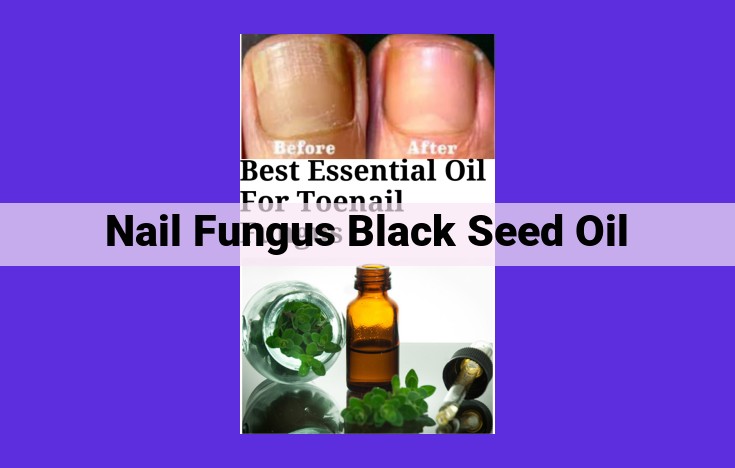Nail fungus, a prevalent issue, requires effective treatments. Black seed oil, derived from Nigella sativa, exhibits promising antifungal properties. Its active compound, thymoquinone, directly targets fungal pathogens. Additionally, it possesses antibacterial, anti-inflammatory, and moisturizing properties that alleviate discomfort and strengthen nails. While generally safe for topical use, a patch test is advised to rule out irritation. Regular application of black seed oil can provide an alternative remedy to traditional medications, offering a natural solution for nail fungus treatment. However, it’s crucial to consult healthcare professionals for proper guidance.
Nail Fungus: A Common and Troublesome Problem
Nail fungus, also known as onychomycosis, is a common condition that affects millions of people worldwide. It is caused by a fungal infection that invades the nail, leading to a range of uncomfortable symptoms. These symptoms can include:
- Discoloration: The nail may turn white, yellow, brown, or even black.
- Thickening: The nail can become thick and hard, making it difficult to trim or wear shoes.
- Crumbling: The nail may become brittle and start to crumble or break off.
- Pain: The nail can become painful, especially when pressure is applied.
Nail fungus is not only unsightly, but it can also be a source of embarrassment and discomfort. It’s essential to seek effective treatment to prevent the infection from spreading and alleviate the associated symptoms.
Black Seed Oil: A Promising Antifungal for Nail Fungus
In the realm of nail care, fungal infections are no stranger, affecting countless individuals worldwide. Nail fungus, also known as onychomycosis, can present itself as a stubborn adversary, its unsightly appearance and discomfort a source of distress for many. While conventional antifungal treatments exist, they often come with their own set of drawbacks. Fortunately, nature provides an emerging alternative: black seed oil.
Black seed oil, extracted from the seeds of the Nigella sativa plant, has garnered attention for its remarkable antifungal properties. Its active compound, thymoquinone, is believed to be the key player in its ability to combat fungal infections. Studies have demonstrated thymoquinone’s potent antifungal activity against various fungal species, including those responsible for nail fungus.
Thymoquinone works by disrupting the fungal cell membrane, leading to the leakage of essential cellular components. This disruption inhibits the growth and spread of the fungal infection, paving the way for the nail to heal.
Antibacterial and Antifungal Properties of Black Seed Oil
Black seed oil possesses remarkable antibacterial and antifungal properties that effectively combat nail fungus. Studies have demonstrated its efficacy against various fungal species, including those responsible for nail infections.
One key antifungal mechanism of black seed oil lies in its active compound, thymoquinone. This powerful antioxidant exhibits strong fungicidal effects. In vitro studies have shown that thymoquinone inhibits the growth and development of nail fungus by disrupting their cell membranes.
Furthermore, black seed oil has been found to interfere with the biofilm formation of fungal pathogens. Biofilms are protective layers that shield fungi from antifungal agents. By breaking down biofilms, black seed oil enhances the effectiveness of antifungal medications and accelerates the healing process.
Research has also revealed that black seed oil contains several other antifungal compounds, such as nigellone and thymohydroquinone. These compounds work synergistically to inhibit fungal growth, suppress infection, and promote nail regeneration.
Studies Supporting Efficacy:
Numerous clinical studies have supported the antifungal efficacy of black seed oil. In one study, topical application of black seed oil significantly reduced nail fungus severity and improved nail appearance in patients compared to a placebo. Another study found that a combination of black seed oil and tea tree oil was effective in eradicating nail fungus in over 80% of participants.
Anti-inflammatory Properties of Black Seed Oil for Nail Fungus
Inflammation is a natural response to infection, but it can also contribute to the discomfort and symptoms associated with nail fungus. Inflammation causes the affected area to become red, swollen, and painful, making it difficult to wear shoes or engage in daily activities.
Black seed oil possesses anti-inflammatory properties that can help to alleviate these symptoms. The active compound in black seed oil, thymoquinone, has been shown to inhibit the production of inflammatory cytokines, which are signaling molecules that promote inflammation. By reducing inflammation, black seed oil can help to relieve pain, swelling, and redness associated with nail fungus.
Furthermore, the anti-inflammatory properties of black seed oil can also help to improve the appearance of fungal nails. Inflammation can cause the nails to become discolored, thickened, and brittle. By reducing inflammation, black seed oil can help to restore the nails to a more healthy and natural appearance.
**Nail Hydration: The Unsung Hero in Preventing Fungal Infections**
Nail hydration is paramount in the battle against fungal infections. Like a sponge, healthy nails absorb moisture. When hydrated, they form a robust barrier against invasive microorganisms. Fungal spores, which thrive in damp environments, find it challenging to penetrate well-hydrated nails.
**Black Seed Oil: Your Nail’s Secret Moisturizer**
Nigella sativa, commonly known as black seed oil, is a natural remedy with exceptional moisturizing properties. Its rich composition of fatty acids and antioxidants nourishes and strengthens nails. Black seed oil forms a protective layer on the nail surface, preventing moisture loss and enhancing barrier function.
By sealing in moisture and strengthening nails, black seed oil creates an unfavorable environment for fungal growth. Its antifungal and anti-inflammatory properties further contribute to its efficacy in combating nail fungus. Regular application of black seed oil keeps nails supple and hydrated, reducing the risk of fungal infections.
Safety and Cautions
- Discuss the general safety of black seed oil applied topically
- Mention potential skin irritation and the need for a patch test before use
Safety and Cautions: A Patch Test to Avoid Discomfort
Black seed oil is generally safe for topical use, making it a convenient remedy for nail fungus. However, it’s crucial to address any potential issues to ensure a comfortable experience.
Potential Skin Irritation: A Rare Occurrence
In some cases, individuals may experience mild skin irritation after applying black seed oil. This is typically due to an allergic reaction or sensitive skin. If you experience any discomfort or redness after using the oil, it’s advisable to discontinue use and consult a healthcare professional.
Patch Test: A Precautionary Measure
To avoid potential skin irritation, it’s recommended to perform a patch test before applying black seed oil to the affected area. Apply a small amount of oil to a patch of skin near the nail fungus. Leave the patch undisturbed for 24 hours. If there’s no reaction, the oil is likely safe to use.
By following these safety precautions, you can enjoy the benefits of black seed oil for nail fungus treatment while minimizing any potential discomfort.
Dosage and Duration of Treatment: Unlocking the Power of Black Seed Oil for Nail Fungus
Unveiling the potent antifungal properties of black seed oil, we now delve into the practical aspects of using this natural remedy to combat nail fungus. Understanding the appropriate dosage and duration of treatment is paramount to maximizing its effectiveness.
Recommended Dosage:
The recommended dosage of black seed oil for nail fungus treatment varies depending on the severity of the infection. For mild to moderate cases, topical application of 2-3 drops directly to the affected nail twice a day is advised. In severe cases, the dosage may be increased to 4-5 drops per application.
Frequency of Application:
Consistency is crucial for successful treatment. Apply black seed oil twice a day, once in the morning and once before bed. This regular application allows the oil to penetrate the nail and exert its antifungal effects over time.
Patience and Perseverance:
Nail fungus is a stubborn infection that requires patience and dedication to eradicate. Results may not be immediate, but with consistent use over several weeks or even months, the antifungal properties of black seed oil will gradually take effect. Patience is key in achieving the desired outcome.
Remember:
- Always dilute black seed oil with a carrier oil, such as coconut or olive oil, to minimize potential skin irritation.
- Perform a patch test on a small area of skin before applying it to the affected nail to rule out any allergic reactions.
- Consult with a healthcare professional if you have any underlying health conditions or are taking medications that may interact with black seed oil.




